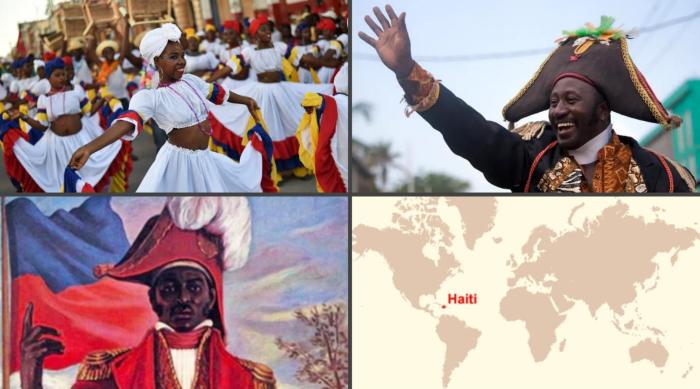The world’s first black led republic crossword – Delving into the annals of history, we uncover the remarkable story of the world’s first black-led republic, a pioneering achievement that reshaped global dynamics and ignited aspirations worldwide. This cross-cultural exploration unravels the intricate tapestry of events, key figures, and lasting legacies that have left an indelible mark on the human experience.
The establishment of this republic was a pivotal moment in the struggle for equality and self-determination, challenging prevailing notions of power and societal structures. Its leaders, driven by unwavering determination and a vision of a just society, navigated formidable obstacles to forge a new path for their people.
Historical Context
The first black-led republic emerged in the Caribbean island of Haiti in the late 18th century. The Haitian Revolution, a successful slave revolt, led to the establishment of the Republic of Haiti in 1804, making it the first independent black-led nation in the Americas and the second in the world.
This event marked a pivotal moment in global history, challenging the prevailing notions of racial hierarchy and European dominance. It inspired other slave revolts and independence movements, particularly in the Caribbean and South America, and contributed to the abolition of slavery in the 19th century.
Key Figures
Toussaint Louverture
A former slave who became the leader of the Haitian Revolution, Toussaint Louverture played a crucial role in the establishment of the Republic of Haiti. His military leadership and diplomatic skills were instrumental in securing victory against the French and British colonial powers.
Jean-Jacques Dessalines
Dessalines succeeded Louverture as the leader of the Haitian Revolution. He declared Haiti’s independence in 1804 and became its first emperor. Dessalines’ ruthless tactics and harsh rule led to his assassination in 1806.
Henri Christophe, The world’s first black led republic crossword
A general under Louverture and Dessalines, Henri Christophe became the president of the northern part of Haiti after Dessalines’ death. He established the Kingdom of Haiti in 1811 and ruled as its king until his suicide in 1820.
Challenges and Obstacles
The first black-led republic faced numerous challenges and obstacles, including:
- Internal conflicts and power struggles: The Haitian Revolution was characterized by internal divisions and conflicts between different factions.
- Foreign intervention: France and other European powers attempted to reconquer Haiti, leading to several wars and occupations.
- Economic instability: Haiti’s economy was heavily dependent on sugar production, which was disrupted by the revolution and the loss of French slave labor.
- Racial prejudice: The international community, particularly in Europe and the United States, was hostile towards the black-led republic, perpetuating racism and discrimination.
Legacy and Impact

The first black-led republic had a profound legacy and impact, both domestically and internationally:
- Inspiration for other independence movements: Haiti’s success inspired other slave revolts and independence movements, particularly in the Americas.
- Challenge to racial hierarchy: The establishment of a black-led republic challenged the prevailing notions of racial superiority and European dominance.
- Abolition of slavery: Haiti’s independence contributed to the growing movement for the abolition of slavery in the 19th century.
- Cultural and social transformation: The Haitian Revolution led to significant cultural and social changes, including the development of a distinct Haitian identity and the emergence of a black elite.
Cultural and Social Significance: The World’s First Black Led Republic Crossword
The first black-led republic had a profound cultural and social significance for the Haitian people:
- National identity: The Haitian Revolution forged a strong sense of national identity among the Haitian people, who had previously been divided along ethnic and class lines.
- Cultural expression: The revolution inspired a rich cultural expression, including music, dance, and literature, that celebrated Haitian identity and history.
- Aspirations for equality: The Haitian Revolution instilled in the Haitian people a deep aspiration for equality and self-determination, which continues to shape their national consciousness.
Comparative Analysis
The first black-led republic can be compared to other notable historical events, such as:
- The American Revolution: Both events were successful revolutions that challenged the authority of a colonial power and established new independent nations.
- The French Revolution: Both revolutions were influenced by Enlightenment ideals and involved a struggle against an oppressive regime.
- The Indian independence movement: Both movements were successful in gaining independence from a European colonial power and establishing a self-governing nation.
However, the first black-led republic is unique in its status as the first independent nation led by a black population, which challenged prevailing notions of racial hierarchy and European dominance.
Key Questions Answered
What factors contributed to the success of the world’s first black-led republic?
Unity, strategic leadership, international support, and a shared vision of a just society.
How did the republic overcome the challenges it faced?
Through diplomacy, economic innovation, military prowess, and unwavering determination.
What is the significance of the republic’s legacy?
It inspired subsequent independence movements, challenged racial hierarchies, and fostered a sense of empowerment among marginalized communities.